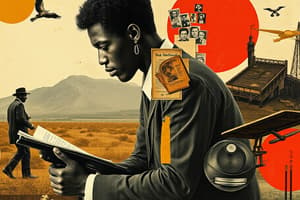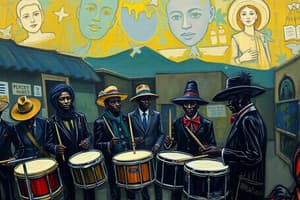Podcast
Questions and Answers
What does the term 'cheese boy' imply?
What does the term 'cheese boy' imply?
Looked down upon to be a cheese boy
How does American culture influence inner-city South Africans and their black identity?
How does American culture influence inner-city South Africans and their black identity?
Boyz in the hood and rap made it cool to be from the hood
Why was the idea of 'crime' arbitrary to Trevor?
Why was the idea of 'crime' arbitrary to Trevor?
Crime cares nobody he saw got hurt
What does Trevor say was the reason for being stuck in his situation?
What does Trevor say was the reason for being stuck in his situation?
What does the destruction of Trevor's computer by a South African police officer indicate about post-apartheid police power?
What does the destruction of Trevor's computer by a South African police officer indicate about post-apartheid police power?
What lesson did Trevor learn after buying an item that made him realize his crimes hurt people?
What lesson did Trevor learn after buying an item that made him realize his crimes hurt people?
Flashcards are hidden until you start studying
Study Notes
Cheese Boy
- The term "cheese boy" denotes a person who is perceived as effeminate or morally weak, which carries a negative connotation in South African slang.
- It reflects societal judgment, implying a lack of masculinity or respect.
American Culture Influence
- Elements of American culture, such as hip-hop, have significantly impacted black identity in inner-city South Africa.
- References to "Boyz in the Hood" and rap music illustrate how these cultural phenomena made street life seem appealing and glamorous.
Perception of Crime
- For Trevor, the concept of crime appeared arbitrary due to the socio-economic conditions and systemic inequalities in post-apartheid South Africa.
- His observation that "crime cares nobody" emphasizes his view that societal rules had little concern for individual harm or community welfare.
Economic Struggles
- Despite mastering their hustle, Trevor and Sizwe faced persistent economic struggles, failing to save enough for college.
- Trevor's explanation of their financial situation suggests that money was often squandered on immediate gratifications, such as fast food.
Police Power Post-Apartheid
- The incident in which a police officer destroyed Trevor's computer symbolizes the unchecked power of law enforcement in a post-apartheid context.
- It reveals a landscape where police acted with impunity, reflecting broader issues of authority and corruption in the system.
Lessons Learned from Crime
- An encounter involving a purchased item brought Trevor to a realization about his actions' impact on others, highlighting the human cost of his crimes.
- This moment of introspection allowed Trevor to empathize with victims, signifying a pivotal shift in his understanding of morality and consequence.
Studying That Suits You
Use AI to generate personalized quizzes and flashcards to suit your learning preferences.




